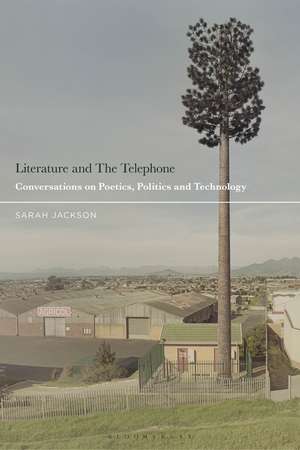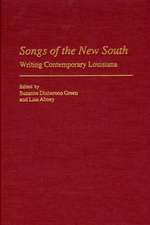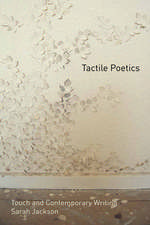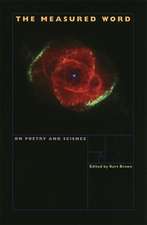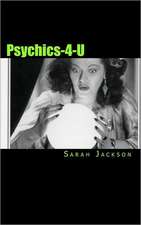Literature and the Telephone: Conversations on Poetics, Politics and Place
Autor Sarah Jacksonen Limba Engleză Hardback – 18 oct 2023
Preț: 510.75 lei
Preț vechi: 731.40 lei
-30% Nou
Puncte Express: 766
Preț estimativ în valută:
97.74€ • 101.47$ • 81.50£
97.74€ • 101.47$ • 81.50£
Carte tipărită la comandă
Livrare economică 22 martie-05 aprilie
Preluare comenzi: 021 569.72.76
Specificații
ISBN-13: 9781350259607
ISBN-10: 1350259608
Pagini: 248
Ilustrații: 10 bw illus
Dimensiuni: 156 x 234 mm
Greutate: 0.52 kg
Editura: Bloomsbury Publishing
Colecția Bloomsbury Academic
Locul publicării:London, United Kingdom
ISBN-10: 1350259608
Pagini: 248
Ilustrații: 10 bw illus
Dimensiuni: 156 x 234 mm
Greutate: 0.52 kg
Editura: Bloomsbury Publishing
Colecția Bloomsbury Academic
Locul publicării:London, United Kingdom
Caracteristici
Examines writing from a wide range of writers, including Will Self, Haruki Murakami, Jon McGregor, Frank O'Hara, Muriel Spark, Graham Greene and Behrouz Boochani, it also touches on work from earlier writers such as Mark Twain, Marcel Proust, Robert Frost, James Joyce, Evelyn Waugh, and Dorothy Sayers
Notă biografică
Sarah Jackson is Associate Professor in Modern and Contemporary Writing at Nottingham Trent University, UK. She is a BBC New Generation Thinker (2016), AHRC Leadership Fellow (2018--2020) and NTU VC Outstanding Researcher (2017). Her publications include Tactile Poetics (2015), Pelt (2012), and a special issue of parallax on the 'unidentifiable literary object' (2019).
Cuprins
Preface: Hello, yes? Introduction - SwitchboardChapter 1 - Queer Lines: Voice and Desire in E. M. Forster, Dana Spiotta and Haruki Murakami Chapter 2 - Scrambled Messages: Networks of Signification in Patrick Hamilton and Jon McGregor Chapter 3 - Telepoetics: Interference and Errancy in Frank O'Hara, Tom Raworth and Fady Joudah Chapter 4 - Secrets: Call and Response in Muriel SparkChapter 5 - Listening--In: Reading Surveillance in Graham Greene, Anna Burns and Will SelfChapter 6 - Calling without Calling: Mourid Barghouti, Jacques Derrida and 'The International Day of Telephones'Chapter 7 - Distress Calls: New (Im)mobilities in Behrouz Boochani and Asiya Wadud Conclusion - Telefutures: Electronic Waste in Emily St John Mandel and Ling Ma Afterword - The Long GoodbyeBibliography
Recenzii
Not just a book about telephony and literature, but a book about how the telephone has actively contributed to the deconstruction of literature and culture, while steadily working to deconstruct our own lives. Jackson acts as the deft operator of a complex international switchboard, taking us through the developments of this process of deconstruction, by way of an exciting range of texts by twentieth-century and twenty first-century novelists, poets, and theorists.
Jackson connects literature and the telephone in powerful and invigorating ways. Through lucid readings of Frank O'Hara, Tom Raworth, Fady Joudah, Muriel Spark, Ali Smith, Mourid Barghouti and others, we come to see how phones are not just thematically important but how they pervade all of our thinking about the nature of modern literature. Literature and the Telephone is also a special kind of listening book, with a particular ear for questions of responding and responsibility. Jackson never loses sight of the inextricably entangled everyday dimensions of her topic - from the nuclear hotline to the Israeli treatment of Palestinians, from refugee boat deaths to the ecological damage and toxic afterlives of the objects so many of us carry around, mostly without thinking, practically everywhere we go.
Jackson's elegant study reconceptualizes the relationship between reading, writing, listening and calling, with an awareness of the wider ethical, political and spatial possibilities of the exchange. In the true spirit of pioneering work like Nicholas Royle's Telepathy and Literature and Avital Ronell's Telephone Book, it is a must-read for anyone fascinated by the uncanny ramifications between the literary and the tele-technological.
Jackson connects literature and the telephone in powerful and invigorating ways. Through lucid readings of Frank O'Hara, Tom Raworth, Fady Joudah, Muriel Spark, Ali Smith, Mourid Barghouti and others, we come to see how phones are not just thematically important but how they pervade all of our thinking about the nature of modern literature. Literature and the Telephone is also a special kind of listening book, with a particular ear for questions of responding and responsibility. Jackson never loses sight of the inextricably entangled everyday dimensions of her topic - from the nuclear hotline to the Israeli treatment of Palestinians, from refugee boat deaths to the ecological damage and toxic afterlives of the objects so many of us carry around, mostly without thinking, practically everywhere we go.
Jackson's elegant study reconceptualizes the relationship between reading, writing, listening and calling, with an awareness of the wider ethical, political and spatial possibilities of the exchange. In the true spirit of pioneering work like Nicholas Royle's Telepathy and Literature and Avital Ronell's Telephone Book, it is a must-read for anyone fascinated by the uncanny ramifications between the literary and the tele-technological.
